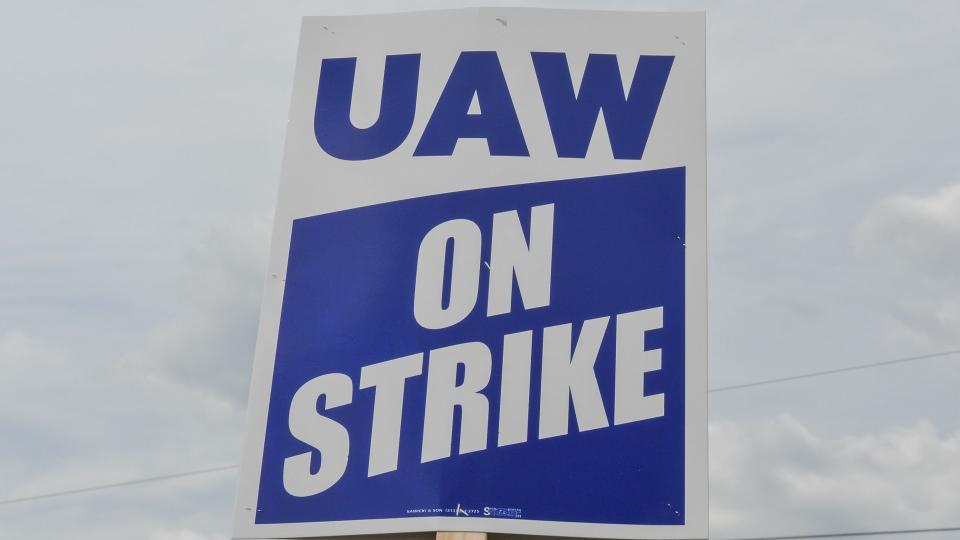Expert Claims Resolution of UAW Strike Will Strengthen ‘Growth of Electric Vehicles’ — Here’s Why

Following a six-week strike, United Auto Workers (UAW) reached what it calls a “historic tentative agreement with General Motors that paves the way for a just transition and wins record economic gains for autoworkers.” And now, some experts argue that the resolution could also strengthen the growth of electric vehicles. (EVs).
More Bang for Your Buck: Cars That Last Twice as Long as Average Vehicles
Be Aware: 6 Used Cars To Stay Away From
“Like the agreements with Ford and Stellantis, the GM agreement has turned record profits into a record contract. The deal includes gains valued at more than four times the gains from the union’s 2019 contract. It provides more in base wage increases than GM workers have received in the past 22 years,” the UAW said in a statement.
The agreement includes 25% in base wage increases through April 2028, and will cumulatively raise the top wage by 33% compounded with estimated cost-of-living adjustments (COLA) to over $42 an hour, according to the statement. The starting wage will increase by 70% compounded with estimated COLA to over $30 an hour.
In a comment to Newsweek, Cornell University professor and labor expert Harry Katz said of the deals, “I think it’s helped, rather than hindered, the growth of electric vehicles.”
Why Does It Matter for EV Growth?
As Newsweek reported, EVs have been at the center of negotiations during the strike against Ford, GM and Stellantis, the company that makes the Jeep, Ram and Chrysler brands.
More: Avoid 5 Electric Vehicles That Will Likely Break Down After 50,000 Miles
During negotiations, industry executives argued they couldn’t produce EVs at scale and remain competitive while paying higher wages, according to Newsweek. But the dilemma proved to be false when automakers granted the deals, Jason Walsh, executive director of the BlueGreen Alliance (a coalition of environmental groups and labor organizations, including the UAW), told Newsweek.
More Costs for EV Makers
Yet, according to Peter C. Earle, economist, American Institute for Economic Research, there are tradeoffs associated with entering wage agreements.
“Yes, the automakers are gaining some increased certainty in their cost structure, but only over the term of the UAW agreement,” said Earle. “And if other aspects of production costs change — for example, higher costs of inputs, such as raw materials — the inflexibility (“stickiness”) of labor costs present a burden to overcome — and quite possibly a factor forcing final prices higher.”
According to him, by agreeing to unionize the workforce at the new EV and battery facilities, another layer of expense has been added to the price of the final product.
“For just like tariffs, regulatory fees, and other such costs, the increased expense of collective bargaining agreements will be borne by the end customer, not by the auto companies,” he said.
EV Makers Have Bigger Issues Than Resolution of Strike and Associated Costs
For Ford, GM, and Stellantis, according to Peter Glenn, founder and co-CEO of EV Life, resolving the strike has a relatively low cost, and more importantly, enables these automakers to get back to addressing two much bigger EV issues: the EV green premium and the lack of reliable public charging.
“One of the developments we’re excited to watch for 2024 is how Ford and GM electric vehicles gaining access to Tesla’s NACS SuperCharger network will improve its sales,” said Glenn.
Glenn added that Tesla’s public charging network is the only reliable charging network in America, so when Ford, GM and other non-Tesla vehicles get access to them in 2024, their EV sales will scale rapidly with consumer confidence in knowing that they can use Tesla’s world class charging network in their Ford or GM vehicles.
“By resolving the labor dispute and scaling manufacturing, Ford and GM can take full advantage of maximizing their EV sales as they gain access to NACS,” he added.
As for the green premium on EVs, Glenn said that it “may be a taller order.”
He noted that according to KBB data, the average price of a non-luxury new car in the U.S. is $45,000. And while the Ford Mach-E, Chevy Bolt and Equinox, and even Tesla’s Model Y and Model 3 start from below $45,000, even these EVs still cost $10,000 to $20,000 more than equivalent commuter ICE vehicles like the Toyota RAV4 and Camry.
“With interest rates unlikely to drop significantly until at least late 2024, automakers and consumers should be looking for new and innovative ways to finance EVs that are different from traditional auto loans,” he added.
More From GOBankingRates
This article originally appeared on GOBankingRates.com: Expert Claims Resolution of UAW Strike Will Strengthen ‘Growth of Electric Vehicles’ — Here’s Why

 Yahoo Finance
Yahoo Finance 